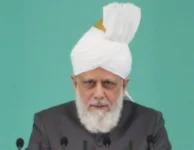In a recent sermon, the leader of the Ahmadiyya Muslim Community, Mirza Masroor Ahmad, continued discussing the military campaigns during the life of Prophet Muhammad. He focused on a controversial incident involving the reported killing of an elderly woman named Umm Qirfah.
Mirza Masroor Ahmad quoted from the writings of Mirza Bashir Ahmad, who closely analyzed the historical accounts of this event. The analysis revealed major discrepancies and inconsistencies between different narrations.
Some versions claimed that Muslims brutally killed Umm Qirfah under the command of either Abu Bakr or Zaid bin Harithah. However, more reliable sources, such as the authentic books of Hadith, did not mention her killing at all.
Mirza Bashir Ahmad argued that the story of Umm Qirfah's murder goes against the clear teachings of Prophet Muhammad. He strictly forbade the killing of women, even during battles. The companions of the Prophet, especially someone as close to him as Zaid bin Harithah, would never have allowed such an act.
Mirza Bashir Ahmad concluded that the account of Umm Qirfah's killing is false and fabricated. It likely originated from an enemy of Islam or a hypocrite. The true version of events is the one recorded in the authentic books of Hadith, which do not mention her murder.
Mirza Masroor Ahmad then moved on to discuss the expedition against Abu Rafi', a Jewish leader who was actively working against the Muslims. Abu Rafi' was wealthy and influential. He used his resources to incite tribes to attack the Prophet and the Muslims.
When Abu Rafi's hostility reached a dangerous level, the Prophet sent a small group of companions led by Abdullah bin Atik to deal with him. The Prophet emphasized that they should not harm any women or children.
Abdullah bin Atik and his companions skillfully carried out their mission. They managed to kill Abu Rafi' without harming anyone else. This put an end to the threat he posed to the Muslim community.
Mirza Bashir Ahmad noted that the killing of Abu Rafi' was justified, given the circumstances at the time. The Muslims were in a weak position and surrounded by enemies. There was no central government or justice system in Arabia. Each tribe acted independently.
The Jews were already at war with the Muslims. Launching an open attack against them would have led to great bloodshed and destruction. In such a situation, the targeted elimination of a dangerous enemy leader was the most prudent course of action.
Mirza Bashir Ahmad also addressed the incident in which Abdullah bin Atik injured his leg during the mission. According to the narration, the Prophet prayed for him, and his leg was healed. It is unclear whether this healing was immediate and miraculous or occurred gradually through natural means.
In conclusion, Mirza Masroor Ahmad's sermon shed light on the complexities of the early Islamic period. He emphasized the need for careful analysis of historical accounts and the importance of authentic sources. The sermon also highlighted the Prophet's teachings of mercy and restraint, even in times of conflict.
Mirza Masroor Ahmad quoted from the writings of Mirza Bashir Ahmad, who closely analyzed the historical accounts of this event. The analysis revealed major discrepancies and inconsistencies between different narrations.
Some versions claimed that Muslims brutally killed Umm Qirfah under the command of either Abu Bakr or Zaid bin Harithah. However, more reliable sources, such as the authentic books of Hadith, did not mention her killing at all.
Mirza Bashir Ahmad argued that the story of Umm Qirfah's murder goes against the clear teachings of Prophet Muhammad. He strictly forbade the killing of women, even during battles. The companions of the Prophet, especially someone as close to him as Zaid bin Harithah, would never have allowed such an act.
Mirza Bashir Ahmad concluded that the account of Umm Qirfah's killing is false and fabricated. It likely originated from an enemy of Islam or a hypocrite. The true version of events is the one recorded in the authentic books of Hadith, which do not mention her murder.
Mirza Masroor Ahmad then moved on to discuss the expedition against Abu Rafi', a Jewish leader who was actively working against the Muslims. Abu Rafi' was wealthy and influential. He used his resources to incite tribes to attack the Prophet and the Muslims.
When Abu Rafi's hostility reached a dangerous level, the Prophet sent a small group of companions led by Abdullah bin Atik to deal with him. The Prophet emphasized that they should not harm any women or children.
Abdullah bin Atik and his companions skillfully carried out their mission. They managed to kill Abu Rafi' without harming anyone else. This put an end to the threat he posed to the Muslim community.
Mirza Bashir Ahmad noted that the killing of Abu Rafi' was justified, given the circumstances at the time. The Muslims were in a weak position and surrounded by enemies. There was no central government or justice system in Arabia. Each tribe acted independently.
The Jews were already at war with the Muslims. Launching an open attack against them would have led to great bloodshed and destruction. In such a situation, the targeted elimination of a dangerous enemy leader was the most prudent course of action.
Mirza Bashir Ahmad also addressed the incident in which Abdullah bin Atik injured his leg during the mission. According to the narration, the Prophet prayed for him, and his leg was healed. It is unclear whether this healing was immediate and miraculous or occurred gradually through natural means.
In conclusion, Mirza Masroor Ahmad's sermon shed light on the complexities of the early Islamic period. He emphasized the need for careful analysis of historical accounts and the importance of authentic sources. The sermon also highlighted the Prophet's teachings of mercy and restraint, even in times of conflict.












